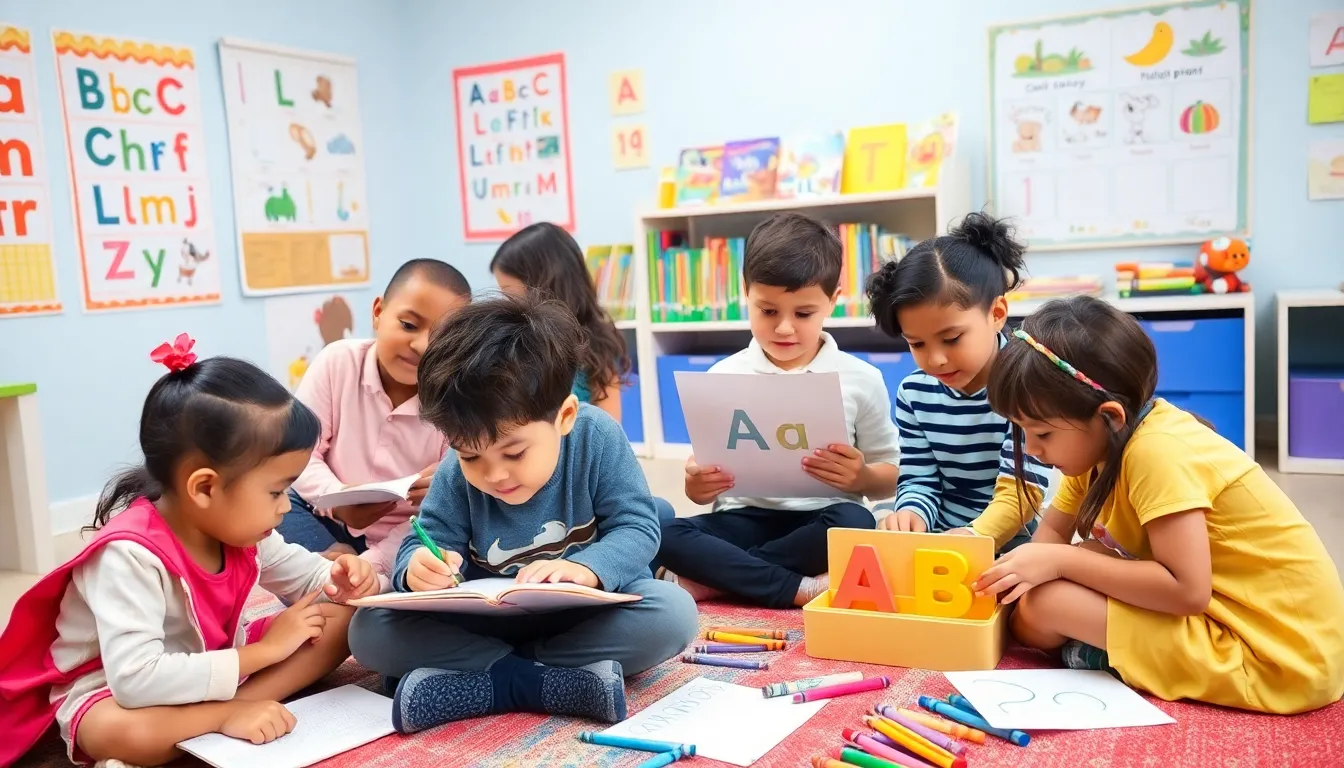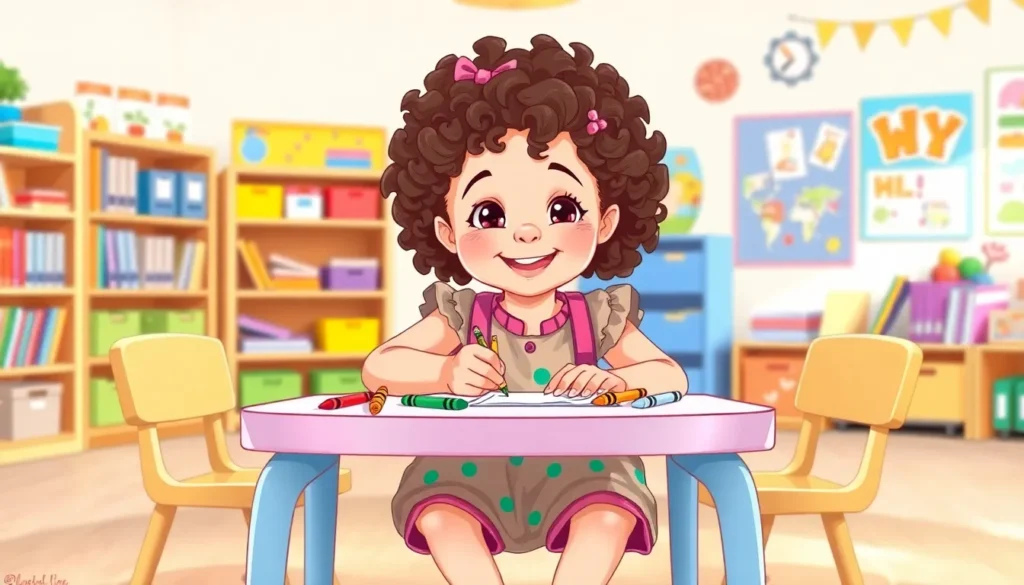Table of Contents
ToggleLiteracy isn’t just about knowing how to read and write; it’s a thrilling journey that every child embarks on. Picture it as a wild rollercoaster ride—filled with twists, turns, and the occasional loop-de-loop of confusion. From scribbles to sentences, each stage of literacy development is a unique adventure that shapes a child’s understanding of the world.
Overview of Stages of Literacy Development
Literacy development unfolds through distinct stages. Each stage marks a specific level in a child’s journey toward mastering reading and writing skills.
Emergent Literacy is the first stage. Children engage in activities like scribbling and exploring books. They learn about print concepts, such as understanding that text carries meaning. This stage often includes recognizing letters and beginning to understand simple sounds.
Early Literacy follows. In this phase, children start to connect letters with sounds more consistently. They experiment with writing by forming simple words and phrases. Familiarity with high-frequency words becomes evident, allowing them to read simple texts with support.
Transitional Literacy represents a more advanced level. Readers gain confidence and independence, capable of tackling slightly complex texts. They develop comprehension skills, enabling them to discuss story elements and make predictions based on evidence from the text.
Fluent Literacy denotes proficiency. Here, readers can enjoy a wide range of literature independently. Comprehension becomes deeper, promoting critical thinking and analysis. They can engage with complex ideas and differentiate between various genres effectively.
Multiliteracies encompass modern literacy in today’s digital age. Children learn to navigate various formats, from print media to digital screens. Skills like evaluating information sources and understanding context are crucial components of this stage.
Recognizing these stages of literacy development guides educators and parents. Each stage presents unique opportunities to foster a child’s growth and understanding of language and meaning. Encouraging exploration and providing supports at each level creates a solid foundation for lifelong literacy skills.
Emergent Literacy

Emergent literacy marks the initial phase of children’s journey into reading and writing. This stage involves discovering the connection between spoken language and the written word.
Characteristics of Emergent Literacy
Emergent literacy encompasses several key characteristics. Children begin to recognize letters, understand that text conveys meaning, and exhibit interest in books. Scribbling represents their first attempts at writing, which often leads to experimentation with letters and words. They might also develop an awareness of sounds in language, learning to identify rhymes and syllables. Curiosity about stories and illustrations drives them to explore different texts. Interaction with adults and peers fosters their understanding of narratives and supports their language development.
Key Activities to Foster Emergent Literacy
Engaging in specific activities can nurture emergent literacy skills. Reading aloud to children introduces them to vocabulary and storytelling. Providing access to various types of books encourages exploration and interest. Activities like letter recognition games and sound identification promote phonemic awareness. Encouraging children to create their own stories through drawing or scribbling develops their writing skills. Singing songs and chanting rhymes enhances their understanding of rhythm and sound patterns. Ultimately, these engaging experiences strengthen a child’s foundation for lifelong literacy development.
Early Literacy Development
Early literacy development establishes the groundwork for a child’s reading and writing skills. This stage is crucial for fostering a love of language and learning.
Skills Involved in Early Literacy
Key skills in early literacy include letter recognition, sound awareness, and vocabulary development. Children recognize letters and begin associating them with sounds. They also explore basic vocabulary through familiar stories and everyday interactions. Engaging with books enhances their comprehension skills. By participating in activities like rhyming and playing with words, children strengthen their language foundation. Social interactions further enrich their vocabulary and understanding of language. These experiences promote confidence in expressing thoughts and ideas.
Importance of Phonemic Awareness
Phonemic awareness plays a vital role in early literacy. It involves recognizing and manipulating individual sounds in words. Children who develop phonemic awareness better connect sounds to letters, improving their decoding abilities. This skill sets the stage for reading fluency and comprehension. Activities like singing, clapping syllables, and playing rhyming games make learning enjoyable and effective. Through these engaging methods, children learn to identify sounds and create words. Fostering phonemic awareness in early development gives children an essential tool for language mastery.
Transitional Literacy
Transitional literacy marks a critical phase in developing reading skills. During this stage, readers become more self-assured, taking on texts with increased complexity while honing their comprehension abilities.
Transitioning to Independent Reading
Transitioning to independent reading involves moving away from relying heavily on guided support. Readers start choosing books that interest them. They learn to identify story elements, including character motivations and themes. Engaging with slightly challenging texts empowers readers to develop a habit of reading for pleasure. Predicting upcoming events in the story becomes a rewarding exercise that enhances understanding. Readers explore different genres, expanding their interests. This stage fosters a sense of ownership; reading transforms from a task into a delightful journey.
Strategies for Supporting Transitional Readers
Supporting transitional readers relies on targeted strategies. Offering access to a variety of reading materials promotes exploration. Encouraging discussions about favorite books fosters critical thinking. Guided reading sessions help refine comprehension while maintaining enjoyment. Providing opportunities for independent book choices nurtures confidence. Incorporating reading partnerships enables peer support, enhancing motivation. Frequent exposure to new vocabulary and phrases builds language skills. Encouragement and positive feedback fuel enthusiasm for continued reading adventures.
Fluent Literacy
Proficient readers engage with a variety of literary genres independently, demonstrating advanced comprehension skills. They analyze texts, think critically, and draw connections to their lives.
Defining Fluent Literacy
Fluent literacy involves reading with speed and accuracy while understanding and interpreting complex texts. At this stage, readers can navigate various genres and formats, enabling them to appreciate narrative techniques and authorial intent. Comprehension extends to identifying themes, characters, and plot developments. Fluent readers express opinions and engage in discussions about literature, further enhancing their understanding of context and meaning.
Benefits of Fluent Literacy Skills
Fluent literacy skills foster confidence in readers, promoting enjoyment and motivation for reading. Critical thinking emerges as readers analyze texts and synthesize ideas from multiple sources. Such skills support academic success across all subjects. Increased vocabulary and improved writing abilities develop through exposure to diverse literature. Additionally, fluent readers connect literature to societal issues, enhancing their awareness of the world around them. Exploring various texts encourages empathy and cultural understanding, vital in today’s global society.
Understanding the stages of literacy development is crucial for nurturing a child’s journey through language. Each phase from emergent literacy to multiliteracies plays an integral role in shaping a child’s reading and writing skills. By recognizing and supporting these stages, parents and educators can create enriching environments that foster growth and enthusiasm for learning.
Encouraging exploration and providing tailored support at every level empowers children to become confident readers and writers. As they progress through these stages, they not only enhance their literacy skills but also develop a deeper understanding of the world around them. This holistic approach to literacy lays the groundwork for a lifetime of learning and engagement with language.







